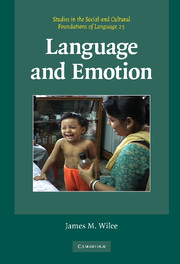Book contents
- Frontmatter
- Contents
- List of figures
- List of transcripts
- Acknowledgements
- Introduction
- Part I Theory
- Part II Language, power, and honor
- 5 Language, emotion, power, and politics
- 6 Status, honorification, and emotion for hire
- Part III Identification and identity
- Part IV Histories of language and emotion
- Notes
- Glossary
- References
- Index
- STUDIES IN THE SOCIAL AND CULTURAL FOUNDATIONS OF LANGUAGE
6 - Status, honorification, and emotion for hire
Published online by Cambridge University Press: 05 June 2012
- Frontmatter
- Contents
- List of figures
- List of transcripts
- Acknowledgements
- Introduction
- Part I Theory
- Part II Language, power, and honor
- 5 Language, emotion, power, and politics
- 6 Status, honorification, and emotion for hire
- Part III Identification and identity
- Part IV Histories of language and emotion
- Notes
- Glossary
- References
- Index
- STUDIES IN THE SOCIAL AND CULTURAL FOUNDATIONS OF LANGUAGE
Summary
Several centuries ago, the English language lost one of its functions – the ability to mark status distinctions grammatically. The loss of T-forms of the second person pronoun – thou, etc. (like French tu and associated verb marking) – left English with only the V-form, you (originally comparable to French vous, requiring analogous forms of verb agreement). English now lacks a grammatical status/intimacy marking system. Such pronouns and agreement forms are analogous to more elaborate systems of honorification in non-Indo-European languages, which occupy us in this chapter. We call such systems honorific registers. Registers are “linguistic repertoire[s] … associated… with particular social practices and with persons who engage in such practices” (Agha 2004: 24). Honorific registers encompass whole sets of lexical alternants that may index respect for one's addressee, bystanders, and/or referents.
I focus here on two sorts of registers as described by Irvine (1990, 1998). Registers such as these are associated with practices (and indirectly with groups), whereas sociolects or social dialects are associated more stably with demographic fractions. Irvine's ethnographic work in Senegal on the emotional and honorific speech of Wolof griots – praise-singers and storytellers descended from slaves, and contrasted in the Senegalese caste system with the nobles who often hire them to speak emotionally on their behalf – shows that affect-laden speech is not a sociolect restricted to griots. Rather, such speech constitutes a register available to nobles, too (Irvine 1990), i.e., anyone who engages in praise or thanks (practices).
Irvine's cross-linguistic generalization that “grammatical honorifics … are embedded in an ideology in which a low-affect style can be other-elevating” (Irvine 1998: 62) is what interests us here.
- Type
- Chapter
- Information
- Language and Emotion , pp. 100 - 106Publisher: Cambridge University PressPrint publication year: 2009

